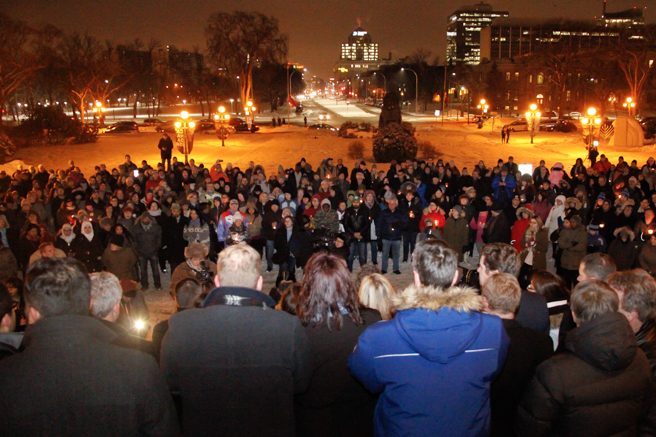The University of Manitoba’s Muslim community is reaching out in the wake of the killing of six worshippers at a Quebec City mosque late last month.
Zeeshan Zamir, president of the U of M Muslim Student Association (MSA), said he is at a loss for words to describe the tragic and distressing Jan. 29 shooting that left six men dead and 19 people injured.
However, he said the immediate showing of support – which began the next morning with emails from professors and members of the university community, and continued in the evening when hundreds attended a vigil on the steps of the legislature – is an opportunity to build relationships.
“Our community members made the statement that this is not the time to be scared, this is the time to open your doors even wider and welcome others so that they can interact with us and we interact with them,” said Zamir, noting the association’s members mulled over increasing security following the attack but the positive response eased their concerns.
He said the MSA is planning on opening its doors and inviting all university community members to visit the mosque on the Fort Garry campus to turn the tragedy into an opportunity to break down divisions and build alliances.
“In the community and media you just hear negative things,” he said, “and if you’re a Muslim and you have a beard, or you go to the mosque, there’s a stigma that follows you.”
“It was very sad but we cannot just sit and cry over it,” he said. “We have to analyze the situation and use all the support that we have been receiving from the community and just don’t stop there – we have to move forward.”
A white, 27-year-old Quebec man and Laval University student has been charged with six counts of first degree murder and five counts of attempted murder while using a restricted firearm.
Authorities have indicated that he may also face terrorism charges following an ongoing investigation.
Hundreds gathered at the provincial legislature Jan. 30 in a show of unity with the Muslim community. Many of those in attendance participated in a special prayer service at the Winnipeg Grand Mosque that same evening organized by the Manitoba Islamic Association.
The vigil was organized jointly by Manitobans for Human Rights and the MSA and included addresses from deputy premiere and minister of justice and attorney general Heather Stefanson, mayor Brian Bowman, and members of the Canadian Federation of Students-Manitoba, among others.
Bowman said such attacks aim to divide the community – and the country – but only bring people closer together.
“As Canadians, now is the time, more than ever, to stand with our friends and our neighbours,” he said. “To let them know that we care about them, that we will protect them, and that this community, and our country, is a place for everyone.”
“A Winnipegger is a Winnipegger is a Winnipegger.”
Bowman led a march of hundreds of people Saturday in the Winnipeg Walk for Human Rights, which circled from the Forks around the Canadian Museum for Human Rights.
Ahmed Farag, of the Manitoba Islamic Association, challenged the idea that Canada’s diversity is a weakness, pointing to the thousands who stood nationwide in support of the families of the victims.
“You may ask yourself ‘why are they out here in the cold standing in solidarity in a vigil for people who they have never met, or may never meet?’” he said.
“The answer is simply one word – humanity. Whether they are Muslims, Christians, Jews, Hindus, atheists or agnostics, we are connected to each other through our humanity.”



